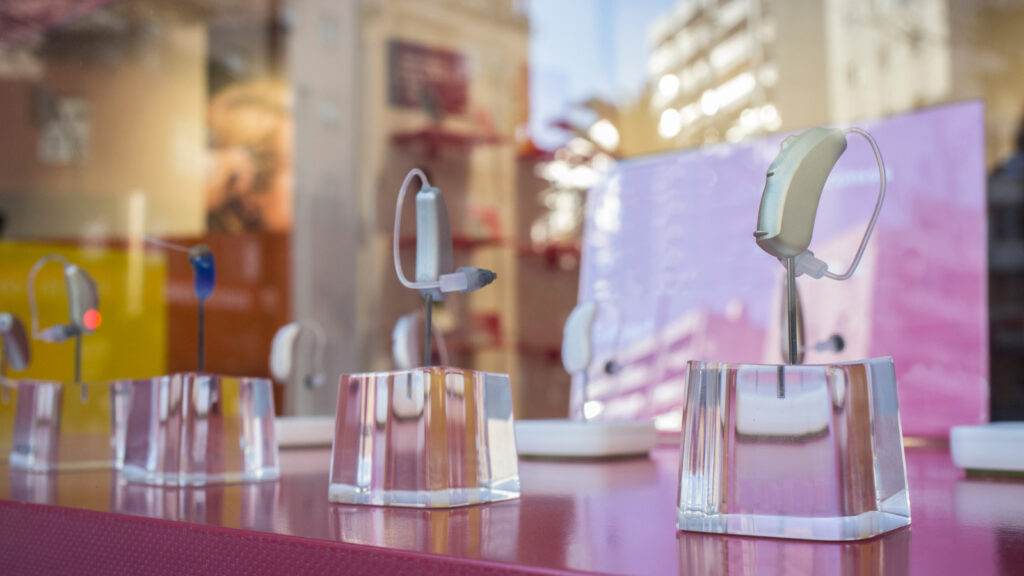Hearing aids are powered by either disposable or rechargeable batteries. Disposable, or zinc-air batteries, have a sticker or tab covering the flat side of the battery. Removing the sticker allows oxygen to enter the battery cell, thus activating the battery. Zinc-air batteries may last anywhere from a couple of days to a little more than a week. Rechargeable batteries are lithium-ion and are encased in the hearing aid. These batteries must be placed in a cradle and charged every night and cannot be removed by the user. Rechargeable batteries will last for several years.
How do rechargeable hearing aids work?
Rechargeable hearing aids use lithium-ion batteries and are dependent on a charging unit to function. Lithium-ion batteries need to be docked in a charger for approximately 3 hours a day to be fully charged. A fully charged hearing aid will provide a full day of power, depending on factors such as hearing loss, lifestyle, and Bluetooth streaming. Many hearing aid manufacturer’s offer a portable battery pack charger for those on the go or for those without access to a power source for a few days. These portable chargers will hold approximately a 3 day power supply. For those with vision and dexterity problems, rechargeable hearing aids are a nice option as they are much easier to manipulate.
How long do hearing aid batteries last?
There are several factors that affect the life of a hearing aid battery. These include type and age of battery, battery size, hours of use, lifestyle, degree of hearing loss/power of hearing instrument, and Bluetooth streaming. Once activated, zinc air batteries typically last anywhere from 3 days to 14 days, depending on the size of the battery. Rechargeable lithium-ion batteries last 4-5 years but must be charged daily for hearing aid use.
312 Batteries VS Other Hearing Aid Batteries
Zinc air batteries come in 4 sizes: 675, 13, 312, and 10, with size 675 being the largest and size 10 being the smallest. The most common size is 312. Regardless of battery manufacturer, the stickers on zinc air batteries are color coordinated with their respective sizes: blue (675), orange (13), brown (312) and yellow (10). Typically, the larger the battery, the longer the battery life. As hearing aids have become smaller and more cosmetically acceptable, the smaller batteries have become more prevalent, with size 312 being the most prevalent. A size 312 battery can last anywhere from 3 days to 10 days. Conversely, a smaller size 10 battery will only last 3 to 7 days and a larger size 13 battery typically lasts 6 to 12 days.
Factors Affecting The Life of Hearing Aid Batteries
- Size of the battery. Larger batteries will last longer than smaller batteries
- Age of the battery
- Number of hours a day the hearing aid is worn
- More severe hearing losses drain the batteries faster
- Streaming to a phone, tv, and other Bluetooth devices
- Heat and humidity can affect the battery life
- Listening environment of the wearer
How long should my hearing aid last before needing replacement?
If are wondering “how long should my hearing aid last,” you should be aware that your batteries play a big role in Its longevity and performance.
On average, hearing aids can last anywhere from three to seven years. Regular cleaning, proper storage, and routine maintenance can prolong their lifespan. However, as technology evolves, you might find that upgrading to a newer model provides improved performance, features, and compatibility with the latest advancements in hearing aid technology.
If you notice a decline in performance, it’s advisable to consult your audiologist to determine whether repairs or an upgrade is the best course of action.
Tips on how to extend the lifespan of your hearing aid batteries
As the energy source of a hearing aid, the quality of the battery that you purchase is very important. Make sure the batteries you buy are fresh. It is best to purchase batteries from your hearing care professional as they buy them frequently and will typically be fresher than what you can purchase in a drugstore or retail store. Do not buy batteries in bulk.
Zinc air batteries are not activated until the tab is removed from the battery. Do not take the sticker off the battery until you are ready to use it. Once removed, the battery will start to drain, regardless of use. When removing the sticker, wait at least a full minute before placing the battery in the hearing aid. This allows more time for the oxygen to get into the battery, thus extending the battery life.
With disposable batteries, make sure you open the battery door on the hearing aid when not in use. This turns the hearing aid off. Although the battery does not stop draining, it reduces the battery drain significantly. For rechargeable batteries, make sure the aids are placed in the charging unit when not in use. If the charging unit is not close by, turn the hearing aids off.
Minimize use of Bluetooth. Streaming to your cell phone or tv will significantly increase the battery drain.
Keep the batteries in a dry environment and store them at room temperature. Do not refrigerate or freeze them.

